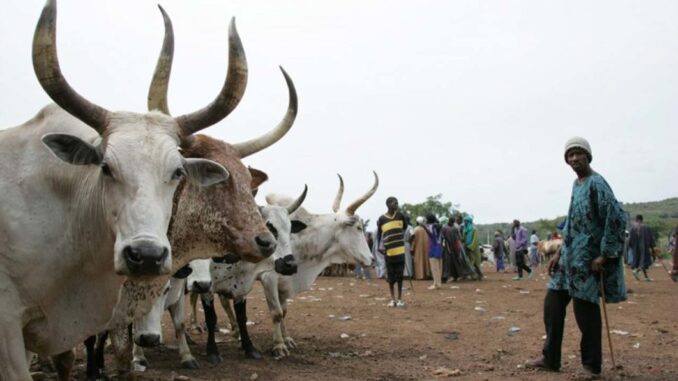
Late last month, the once controversial National Livestock Transformation Plan (NLTP) gained currency anew. The new development was that the Federal Government got some support funding to the tune of €400,000 from the Netherlands. This has led to the Federal Government commencing talks with the Nassarawa State government for the kick-off of the pilot implementation of the NLTP. The approved grant by the Dutch Investment Agency (RVO) will cover 50 percent cost of the pilot project in Nassarawa State for 30 pastoralist households and is billed to start this month.
It is important to revisit the background to the NLTP, and to state that the latent function looms large than the ostensible gains. The latent function is the quest for land grab and domination while the ostensible gains are to exploit the value of livestock development worth several trillion of naira, which had been neglected over the years; provide modern meat and dairy industry and with integrated crop farming.
Indeed, the NLTP designed to run from 2019-2028, is presented as part of Federal Government’s initiative in collaboration with states under the auspices of the National Economic Council. Seven states topped the list in terms of the implementation of the pilot project. They include Adamawa, Benue, Kaduna, Plateau, Nassarawa, Taraba and Zamfara. Specifically, it is a collaboration project between the Federal and State governments, farmers, pastoralists and private investors. As if to re-assure the incredulous public, it was emphasised that it was the prerogative of the state government and private investors who are expected to provide the land without the meddlesomeness of the Federal Government in land acquisition. According to the Vice President, Prof Yemi Osinbajo when the plan was inaugurated, “Any participating state will provide the land and its own contribution to the project. The Federal Government merely supports…This solves the problem of cattle grazing and destruction of farmlands. It ensures a practical response to the pressures on water and pasture by forces of climate change.”
The justifications then and now are sheer sophistry and cannot undermine the original motive of land grab. And it is difficult for a besieged population to accept. This was the reason why at NLPT inauguration, VP Osinbajo emphasised that “this is not RUGA; because the idea of RUGA settlements launched by the Ministry of Agriculture created a problem when it was perceived as a plan to seize lands to create settlements for herders.”
It would be recalled that rural grazing area otherwise known as RUGA that translates into human settlement in Hausa, was imposed by the presidency and was instantaneously opposed by many Nigerians. It was viewed as no other thing than a tool of ethnic domination and conquest as it seeks to create territories for Fulani people all over the country. RUGA was the height of the impunity of the incumbent administration. Unfortunately, the motive has continued to manifest in various policy shifts in different guises.
We like to state in unequivocal terms, that agriculture is under the concurrent list of the 1999 Constitution as amended, and state governments are free to establish farms. But the Federal Government may have policy from which states could draw from but it is not necessary for the Federal Government to get entangled, in the circumstances. As we have stated before on this page, animal husbandry is a private business, public investment is not abhorred. State governments are free to create commercial farms but not one that is being imposed via dubious sponsorship by the Federal Government for a particular ethnic minority to occupy indigenous spaces and locations across the country. The recently broached idea of selling Federal Government land across the country is laden with ulterior motive, perhaps, another realisation of RUGA by other means. It is RUGA through the backdoor. State governments should watch out, there is no end for what an irredentist government at the centre can do.
For a complex country like ours, controversial policies seeking to aggrandise a particular group must be avoided; more so as it runs against the grains of federalism. In an ideal federation, central authority could give grant to component units willing to invest in any venture beneficial to its people and the country in general. But sectional interest aimed at changing the national demographics for aliens cannot work in this country. Restructuring to meet the substance of a federation that the founding fathers arrived through various constitutional conferences before independence should be prioritised at this time than parochial policies that are bound to fail.
To start with, the very idea of a federal ministry of agriculture in a federation is a misnomer. The country is too diverse to be tied to the apron spring of a federal ministry of agriculture, that the central government would want to use to impose cattle rearing business, which is organically a private business. The land they want to exploit from Abuja belongs to the people, not the Federal Government. The only land that the Federal Government owns in Nigeria is the Federal Capital Territory’s. So, any Federal Government’s attempt to lure state governments in six geo-political zones into any capital-intensive agro-business is against the spirit of federalism we have been advocating here for the past 20 weeks. This is not particularly different from the ranching projects that state governors have agreed should be the modern way to go in this convoluted federation. This is a time to dismantle the foundation of the evil superstructure of the unitary system that has held down this country since 1966.
END

Be the first to comment